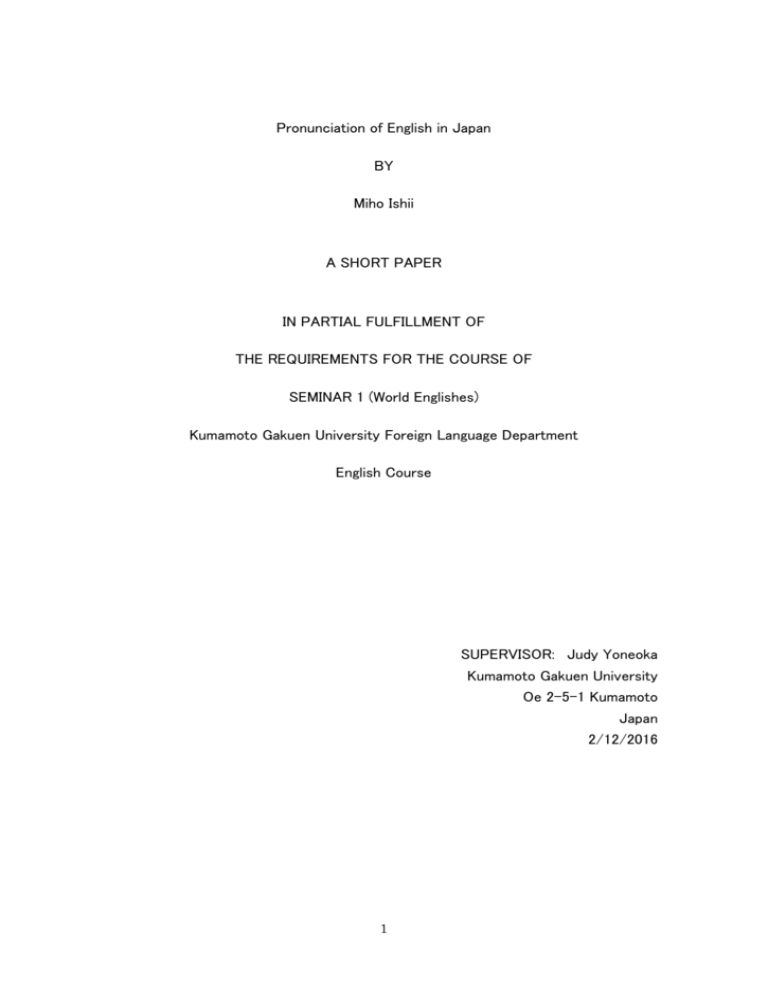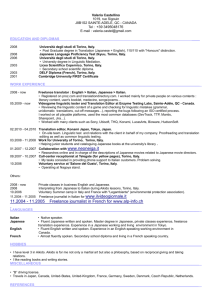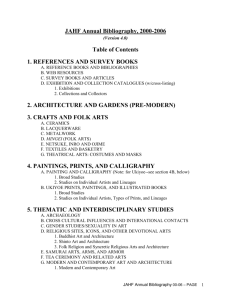Bibliography
advertisement

Pronunciation of English in Japan BY Miho Ishii A SHORT PAPER IN PARTIAL FULFILLMENT OF THE REQUIREMENTS FOR THE COURSE OF SEMINAR 1 (World Englishes) Kumamoto Gakuen University Foreign Language Department English Course SUPERVISOR: Judy Yoneoka Kumamoto Gakuen University Oe 2-5-1 Kumamoto Japan 2/12/2016 1 1. Introduction Most people speak English. English speakers have exceed over 300,000,000 people all over the world. Almost English can be found in almost every country. Japanese learn English at school since junior high school in Japan but classes focus on grammar so many people don’t master pronunciation. Today Japanese often use Katakana English so English pronunciation. Japanese people make mistake under the discussed influence of Katakana English. Discussed in this paper; I’ll compare Japanese English and native English ① Japanese English pronunciation ②Katakana English. 2. Japanese English pronunciation Japanese has a syllabic-timed rhythm. It is that each sound occurs at the same interval and makes rhythm. Japanese is pronounced by syllable. English has a stress-timed rhythm. It makes rhythm that almost same interval from stress. Thus, the difference between Japanese and English rhythm is syllabic-timed or stress-timed. Japanese don’t feel strength in the rhythm of the sentence, because Japanese has the same strength each syllable. For native speakers of Japanese it is difficult to communicate with native speaker of English. There are three reasons. (1) Difference of pronunciation The Japanese consonant is much smaller than English. Most people often make substitutions. Japanese doesn’t have 「L」 and 「R」 pronunciation. But Japanese can’t understand 「La」 「Ra」 is written because they hear 「ラ」 by ear. So both “light” and “right” have the same sound. Si, Shi, Thi シ Fu, Hu フ Di, Ji, Zi ジ Bi, Vi ビ The example above as well as 「L」 and 「R」. All are pronounced the same way. Japanese people hear the same sound so they don’t know the difference between “fu” and “hu” and so on. Japanese has many consonants that don’t know the difference but it has few vowels. /ɵ/ → /s/ , /f/ →/h/ and /f/ substitute /h/. 2 (2) English consonant sounds For example, 「circle」. Japanese people pronounce 「サークル」, 「サ・ア・ク・ ル」. It is forth syllable in Japanese but English pronounce at a stretch. If Japanese people pronounce part of 「cle」, it include vowel 「ku-ru」 in Japanese. Native English speakers pronounce part of 「kle」 that use tongue. Japanese has 5 vowels but include confuse the vowels. Confuse the vowel example is “catch, cut, cot, cart, curve” “ǽ, ʌ, ɑ, ɑ:r, ə:r”. Japanese has four euphonies. Especially peculiar euphony is 「ん」 「っ」. English doesn’t have this (3) Japanese has plural meaning per a word pronunciation Japanese choose one from infinite combination. It means Japanese is said languages of imagination. For example, 「聞く」 in Japanese. This same phonemic word have many meanings, 「菊」 「利く」 「 効く」 「聴く」 and more. Thus Japanese decided exact word by connection. We combine word with a stroke of the pen. It is the difference between Japanese and native English speaker. 3. Japanese Katakana English Japanese often use Katakana English. Katakana is used for words loaned from foreign country. Our English pronunciation has been in disorder since Katakana English came to Japan. Because of this pronunciation is difficult. Japanese people are that English words become Katakana pronunciation words. Katakana pronunciation has three characteristics that can’t sound only consonant “s, t, k” and vowel substitute “a, i, u, e, o” finally, can’t sound consonant “r, l, th”. Then, consonant of Katakana add vowel. 1) [f], [v], [s], [k], [g], [p], [b], [l] Next consonant add [u] and [フ], [ブ], [ス],[ク],[グ],[プ],[プ],[ブ],[ル]. Pool プール, soup スープ, boll ボール 2) [k] Next consonant add [u], in case add [i] become [キ]. Cake ケーキ, strike ストライキ 3) [t], [d] Next consonant add [o] become [ト],[ド]. Toast トースト, drum ドラム 3 4) [ch] become [チ]. Touch タッチ, cheese チーズ 5) [sh] become [シュ]. English イングリシュ, Native English speakers can’t understand Japanese English, it is mainly because of Katakana pronunciation. English has “th, s, sh” pronunciation but Japanese people pronounce same sound 「シ」. Also “i, g, r, ǽ” pronounce all 「ア」 and “l, r” is same pronunciation because Japanese people don’t separate these sound. 1) 2) 3) [th], [s], [sh] Something (サムシング), sea (シー), she (シー) It pronounces same sound 「シ」 in Japanese. [i], [g], [r], [ǽ] Ice (アイス), garlic (ガーリック), rice (ライス), shampoo (シャンプー) [l], [r] Rord (ロード), lord (ロード) 3. Conclusion This paper is aimed at pronunciation of English and Japanese Katakana English and the difference. English pronunciation is difficult for Japanese people by marked confusion in Katakana English. Therefore native English speakers and Japanese people give rise to misunderstandings from difference pronunciation. However Japanese Katakana English is the mother tongue and culture to Japanese people. Bibliography Japanese English pronunciation Available at; http:// www.howtoeigo.net/pro2.html (12/2004) Katakana pronunciation Available at; http://www.scn-net.ne.jp/~language/kyosokhon/ky1eKatakanashiki.htm (12/2004) Katakana pronunciation Available at; 4 http://www.hippocampus.jp/katakana.htm (12/2004) Difference of Katakana English and English pronunciation Available at; http://www.scn-net.ne.jp/~language/kyosokhon/ky1eKatakanashiki.htm (12/2004) Japanese English pronunciation Available at; http://www.tcct.zaq.ne.jp/nitta/monolog/028.html (12/2004) 5 Introduction 1. Japanese English pronunciation (1) vowel (2) difficult pronunciation to Japanese 2. Katakana English (1) pronunciation of katakana words and English (2) difference meaning between Japanese and English 3. Conclusion 6 Bibliography Kerii, I. (1991) Nihonjin eigo no kazou kouza (in Japanese), Tokyo:JICC syuppansha. Kurokawa, S. (1978) Toyko:Natsumesha. Nihongo to Eigo no Aida (in Japanese), Ide, S. (1986) Nihonjin to Amerikajin no keigokoudou (in Japanese), Tokyo:Nauundou. Saishou, F. (1982) Eigo to Nihongo (in Japanese), Tokyo:Kenkyusha syuppan. Yamamoto, Y. (1993) Eigo no kokoro (in Japanese), Tokyo:Maruzen. 7





